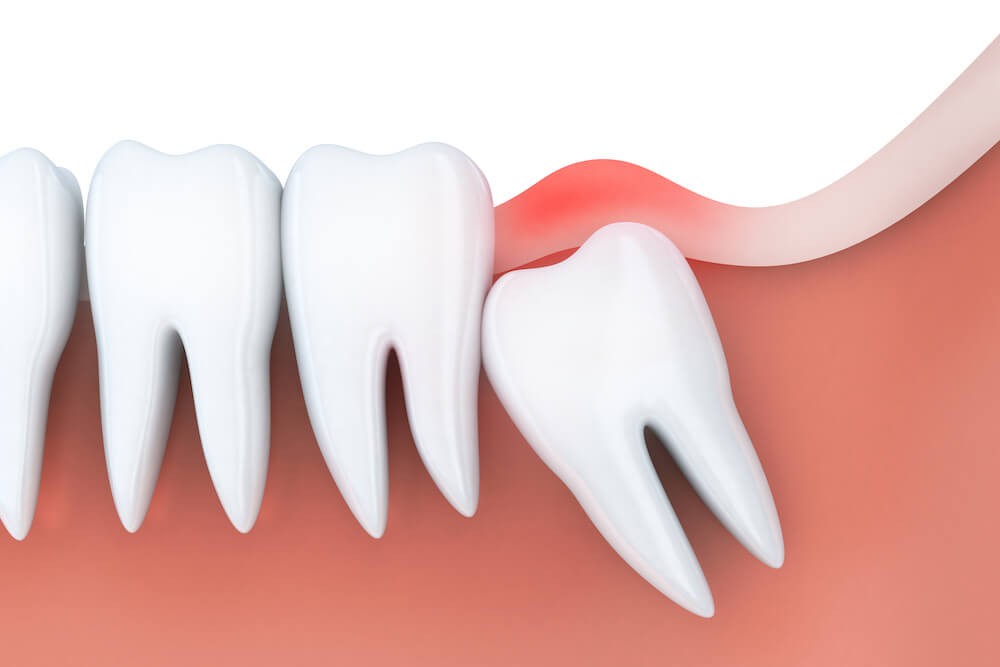Safe and Proactive Wisdom Tooth Extraction
Wisdom teeth may have been helpful in the past, but today, they more often than not pose a problem for many patients of the Dental Center of Jacksonville. While not all wisdom teeth require removal, it’s not uncommon for them to cause issues with multiple aspects of your oral health. The good news is Jacksonville dentist Dr. Landis, our in-office oral surgeon, can safely and comfortably remove wisdom teeth that pose a threat to your oral health and wellbeing. Don’t wait to get the treatment you need. Contact our office to schedule an appointment!
What are Wisdom Teeth?
Wisdom teeth today are considered to be evolutionary relics that did serve a purpose at one point. When humans were still considered hunter-gatherers, wisdom teeth helped replace molars that were lost as a result of poor oral hygiene and minimal access to certain foods. In many cases, these populations would need to resort to eating sticks and reed plants, resulting in consistent tooth loss. This is also why wisdom teeth are sometimes referred to as third molars.
What is an Impacted Wisdom Tooth?
Wisdom teeth are the final or the third set of teeth to erupt. They are often impacted because they don’t have adequate space to erupt. Impacted wisdom teeth are teeth that have not erupted through the gum line or have partially erupted. Impacted teeth are usually the result of crowding in the mouth.
When teeth are crowded, there isn’t enough room for them to come in properly. Impacted wisdom teeth can cause swelling, pain, and infection of the gums. When these symptoms persist, we recommend surgical extraction.

Why Would I Need an Extraction?
Thanks to modern advancements, including oral care products and grocery stores, humans rarely need wisdom teeth to replace their third molars anymore. But that doesn’t stop them from erupting. In many cases, an erupting wisdom tooth can force existing teeth out of alignment, making your bite uneven. Furthermore, erupting teeth generally result in chronic pain in the back of the mouth and even a higher risk of oral infections. This is particularly true if the tooth becomes impacted, or trapped underneath other teeth while erupting. Wisdom teeth can also become problematic if they are trapped underneath gum tissue.
If a wisdom teeth poses no immediate issues or does not interfere with your current alignment, they do not necessarily need to be removed. However, their removal is typically a precautionary one and our dentists will make absolute sure if they pose an issue or not before recommending extraction.
The Wisdom Tooth Extraction Process
The process for removing a wisdom tooth is very straightforward. After numbing your tooth and surrounding tissue (as well as administering sedation if requested), we can begin the process of gently rocking the tooth back and forth to break it from the supportive structures holding it in place. If the tooth is trapped underneath gum tissue, we’ll make a small incision in this tissue in order to access the tooth. In more complex cases, we will break the wisdom tooth into smaller pieces to extract it that way.
Essential Aftercare to Know
Upon completion of your treatment, our office will provide necessary instructions to help you prevent any complications. These include but are not limited to:
- Biting down on a gauze pad and replacing them as needed to promote clot formation
- Keeping a soft diet while avoiding the extraction site
- Practicing daily oral care while avoiding the extraction site
- Getting plenty of rest
- Taking painkillers as needed
- Using ice packs to reduce swelling
- Avoiding straws for the next 24 to 48 hours
- Avoiding all tobacco products
What Problems Can Occur if I Do Not Remove My Wisdom Teeth?
If you do not remove your wisdom teeth, several problems can occur. They may become impacted, meaning they grow sideways instead of straight out. This can cause pain, damage to other teeth, and infection. They may also crowd other teeth and cause orthodontic problems. Wisdom teeth that are not removed can also lead to bad breath, tooth decay, and gum disease.
Leaving wisdom teeth in can cause cysts or tumors that damage your jawbone and other surrounding tissues. If left untreated, these issues could require surgery to repair the damage caused.
What is the Best Age to Extract My Wisdom Teeth?
There is no one answer to this question, as the best age to extract wisdom teeth depends on several factors. Some people may need to have their wisdom teeth removed at a younger age, while others can wait until they are older. The best age to extract wisdom teeth is a decision you and your Jacksonville dentist should make after considering all the relevant factors.
What Are Dry Sockets?
Dry sockets are complications experienced when dental patients have their wisdom teeth extracted. They occur when the blood clot that forms in the socket after surgery becomes dislodged or dissolves, exposing the bone beneath. Dry sockets happen in about 2-5% of all tooth extractions.
The complications are painful and can delay healing. Symptoms include severe pain, bad breath, and an unpleasant taste in the mouth.
If you have a dry socket in Jacksonville, your best bet is to schedule a consultation with the team at The Dental Center of Jacksonville. Dr. Patel or Dr. Barbela will clean the debris from the dry socket and place a medicated dressing in it. The dressing numbs the pain and protects the bone and nerves underneath. You will need to return to have the dressing changed every day or two until the socket heals.
